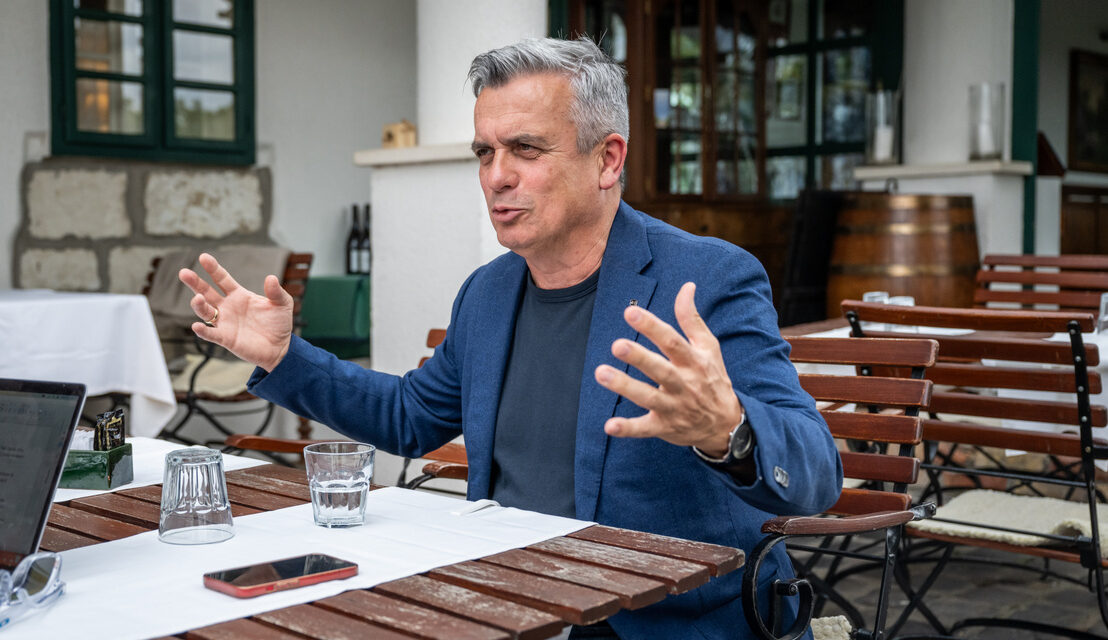There is a demand for Hungarian wine in Asia, the visit of the Chinese president can also give our exports a big boost - says Pál Rókusfalvy, the government commissioner responsible for national wine marketing, in the interview.
He spoke in detail about the need for a change of attitude among Hungarian winemakers, who need to respond to the world trend of reduced-alcohol and alcohol-free wines, just as it is necessary to make room for digital solutions in Hungarian cellars in order to make production economical. The issue of zero tolerance was also discussed.
According to Xi Jinping, "Chinese-Hungarian friendship is like good Tokaj wine: fragrant, sweet, substantial and long-lasting." How would you characterize the words of the Chinese president from a diplomatic or winemaking perspective?
I am very happy with this statement, as we know very well about Chinese diplomacy that their president rarely mentions specific products. In the case of our 500-year-old value, our flagship, the highly prestigious Aszú in Tokaj, he did this, which made the world press. It's no wonder that ambassadors and consuls-general congratulated me afterwards.
We can be proud of this analogy, especially from the leader of one of the world's biggest powers, and we can also be happy about it from the point of view of wine marketing, because Chinese consumers traditionally attach great importance to such statements.
We have visited China several times in the past six months, and it was an unforgettable experience that the first time the political leader who received our delegation recited a poem by Petőfi in Mandarin, while they erected a statue of Júlia Szendrey, the wife of the great poet.
But how do we get from the Petőfi cult to the hoped for and expected stores?
We have already concluded several promising agreements and declarations of intent in the Far East, so, for example, Szechuan spicy and Tokaj sweet can form a duo in gastronomy that opens the door to Michelin-starred restaurants. Asia is an important market, where we can already report a permanent agency-level presence. In addition to China, Japan and South Korea may become more and more important, the latter becoming an important area from this fall. Aszú wine is often based on Furmint, which I am convinced can bring Tokaj-Hegyalja a good reputation in itself, but for example we can also find significant markets for bikavér in the east, which is a starting point for Eger and Szekszárd. We need to leave behind the old bad memories, such as wine counterfeiting, exporting large quantities of low-quality wines, and show the prevailing quality today, because there are plenty of opportunities for market acquisition.
The Tokaj aszu is a diplomatic stickler
Do high-ranking guests always get tokaji? So, from Erdogan to Macron and Merkel to Netanyahu, no one could return home without a good assu? How does the selection of protocol gifts work?
What is the Zöldveltelini for Austria, is the Tokaj aszú for Hungary, so it is a practical gift, especially for the leader of a country where it is held in high esteem. While we could only start dealing with wine marketing last year, the Austrians have been doing this since 1986, so we have something to bring. The Tokaj aszú is also a diplomatic touchstone for us in the wider world, but not everyone gets a 75-year-old aszú made with a unique label from the country's museum wine collection. In this form, we tried to give a way to the 75th anniversary of diplomatic contact between China and Hungary.
Even more special than the presentation of gifts by secular leaders was when I arrived for an audience with Pope Francis, to whom we took 180 bottles of wine from the 30 best wineries in Tokaj, which have been the jewels of the Vatican cellar ever since.
On St. John's Day, the Holy Father gave an apostolic blessing to the Tokaj assú and through it to Hungarian wines. This is much more than a promotion, the umbrella celebration of Wines of Hungary: when these special bottles are put on the table, it is not only a special event for us, but also for them.
If the souvenir is not for the Pope or the Chinese president, but serves to present the Hungarian wine culture, what kind of six-bottle selection would you surprise a foreign friend with?
It is important that it contains varieties with Hungarian roots, as we have to show uniqueness to the world - what we do best. For example, a huge opportunity for the international promotion of Hungarian wine culture is the fact that wines made from grapes grown on volcanic soils are becoming more and more popular due to their unique taste and characteristics, but they account for only one or two percent of the world's wine production, in our country it is more than 30 percent. This makes us interesting and exciting to the wider world. It is also no coincidence that volcanic wines have an ambassador, a Canadian master sommelier named John Szabo. He is of Hungarian origin and loves Hungarian wines.
The six selection included in the question also starts with the Tokaj aszu, but let's not forget the Kékfrankos, which accounts for 20 percent of the Hungarian vineyards, which, although it only grows in an area half the size of the Austrians, has been cleverly positioned as blaufränkisch.
World red wine trends are also pointing in the lighter, fruitier direction, to which Kadarka, in addition to Kékfrankos, also corresponds, so it certainly has a place in the selection. But white wines make up 86 percent of our exports, and this fact calls for a good Furmint from Tokaj, a nice Irsai Olivér or an Italian Riesling from Balaton, and an excellent Hungarian champagne.
Speaking of Hungarian champagne, we have a good guess that at least 60 bottles will pop here in Etyek, where we are talking, this September. But in addition to the personal thread, I would also like to know what, in your opinion, is the role and mission of the "Budapest vineyard"?
Family is very important to me, and I'm not just thinking of my four children and two grandchildren. We are six siblings, our father is 93 years old, our mother is 88. I want nothing more than to celebrate with them. I had a big party on my 50th birthday, it went really well, but I'm not planning a similar one this year, not least because age is just a condition. As for Etyek, it is not only the vineyard of Budapest, but also the capital of champagne. A traditional champagne-making region, it is not the already mentioned volcanic, but the calcareous soil that determines the
And the climate of this cooler part of the Zsámbéki basin is like champagne.
The next generation will no longer make still wines, but more and more champagnes, the protection of origin of which is also in our hands. The future belongs to bubbly drinks, especially in the summer, and I'm not just thinking of champagne here, since we're in the country of spritzers.
The entire article can be read on the Index!
Featured image: Tamás Kaszás / Index













